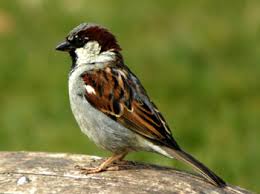Why You Should Buy Wild Bird Seed without Millet or Cracked Corn- Attracts Invasive House Sparrows. Normally, we buy Ultra Blue Black Oil Sunflowers Seeds but a few weeks ago we mistakenly got Concerto – which is a mix with millet seeds.
First, the Blue Jay just stood and flicked out all the millet. Finches and chickadees throw it on the ground in search of sunflower seeds. Then, everything was eaten but the millet. Then instead of 1-2 house sparrows, we ended up with 20 house sparrows because it is easy to crack and eat. House Sparrows prefer to eat seeds without shells. Using Black Oil Sunflower will discourage them.
Millet and cracked corn are “filler” ingredients to drive costs down.
House Sparrows are very prolific parents and often dominate feeders and preventing other birds access and they will take over nesting sites, territories and food sources of native birds. They will evict other nesting birds and destroy their eggs, kill the nestlings and even kill an incubating female. And once they establish a territory they remain year round and often prevent bluebirds and swallows from nesting.
House sparrows a prolific breeders raising four broods per season compared to just 1-2 for bluebirds and they have 4-5 eggs. Learn more from Cornell.
In addition to Black Oil Sunflowers, we also buy unsalted peanuts at Tops and feed 5-6 with a pile of sunflower seeds on the deck away from the other feeders so the smaller birds can go to the feeders.
And, unless you are in a rural location, cracked corn is not great either but pheasants and wild turkeys like it. Again cracked corn is mainly eaten by House Sparrows and Doves but Doves will also eat Sunflower Seeds.
So, Sunflowers Seeds, unsalted peanuts and Thistle Seed (for goldfinch) and suet. Tube Feeder for Sunflowers, Tube feeder for Thistle, Roof Bird Feeder with suet holder. Suet attracts woodpeckers. You will be chickadees, goldfinch, tufted titmouse, blue jay, cardinals, nuthatches, multiple types of woodpeckers, red polls (depending on season–sometimes migrate from Canada), carolina wren to name a few.






